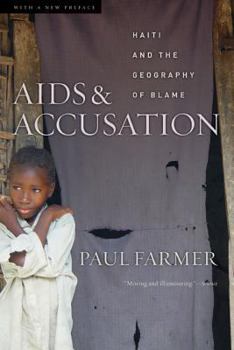AIDS and Accusation: Haiti and the Geography of Blame, Updated with a New Preface
Select Format
Select Condition 
Book Overview
Does the scientific "theory" that HIV came to North America from Haiti stem from underlying attitudes of racism and ethnocentrism in the United States rather than from hard evidence? Award-winning author and anthropologist-physician Paul Farmer answers with this, the first full-length ethnographic study of AIDS in a poor society. First published in 1992 this new edition has been updated and a new preface added.
Format:Paperback
Language:English
ISBN:0520248392
ISBN13:9780520248397
Release Date:May 2006
Publisher:University of California Press
Length:372 Pages
Weight:1.18 lbs.
Dimensions:0.9" x 6.7" x 8.9"
Customer Reviews
3 ratings
Reading this book will change your life
Published by Thriftbooks.com User , 22 years ago
Farmer's excellent historical ethnography of Haitian illness (as seen through the contemporary context of the world AIDS epidemic), proves the necessity of developing anthropological approaches to understanding health systems and implementing medical care. The diagnosis and analysis of sickness, disease, illness, and treatment should go hand-in-hand with the cultural understanding of local systems of blame, accusation, causation, and cure. Where most approaches to medicine are based on the "Westernized" first-world nations' understanding of the causes of illness (tainted as well, as Farmer shows, by systematic "blame the victim" and shame techniques), the adoption of these approaches in treating the illnesses of other peoples can be catastrophic. Three ethnographies make up the structure of a detailed historical inquiry ) The longstanding tradition of conceiving of illness through the lens of powerlessness shapes the contemporary lives of the people in Haiti with whom Farmer worked. Although they could see the effects of the illness, people in this region were obsessed with the cause of the illness, and felt the need to understand AIDS through a constructed narrative of blame. A deep belief in their religion led villagers to look for the source of witchcraft that could possibly be harming them, and elaborate stories about neighbors, jealousies, and rivalries flourished as a result. Any improvement in the standing of one member of the society (through wealth, status, relationships, acquisition of property or food, or political power through employment or marriage) adds to the structure of distrust and blame. Farmer's book shows how disturbingly complex and deep the layers of mistrust, misinformation, and the effects of racism, are. Among the medical hypotheses for the probable exposure is the theory of Haitian sex-workers' contacts through gay tourists to the early strains of HIV. Farmer outlines the long history of Haiti as a gay tourist attraction, and Duvalier's encouragement of tourism as a boost to the domestic economy. Although the possible cause of the gay sex trade for HIV exposure has not been confirmed, medical establishments in the U.S. based their theories of causation on other factors, such as Haitian religious practices. These theories were, in truth, reinforcing longstanding ignorance and racist misunderstandings about Haitian vodou. Stereotypes and racial profiling of Haitian citizenship as a "risk factor" (one of the "Four H's" along with hemophiliac, homosexual, and heroin user), contributed to public policies against Haitian immigrants. Haitians' belief that they are being attacked by some evil sorcery in the guise of a fatal illness called sida falls into place amidst the context of extreme antagonism and injustice. While reading this book, I was compelled to ask myself if there isn't some truth in Haitians' understanding of AIDS as the result of malicious sorcery. Haiti was the only American society to successfu
One of the 4-Hs shouldn't be.
Published by Thriftbooks.com User , 24 years ago
This book dispels the common myths of Haitians and AIDS. It also shows very clearly the heavy involvement of the United States in creating the poverty Haiti has faced. This book makes use of statistics well, but unfortunately, at this point those stats are many years old. When Farmer wrote this book, only three people in the village of Do Kay had died of AIDS. Now, with huge percentages of Haitians exposed to HIV, the picture must certainly look different. This book is a geat candidate for a revised edition some time in the future.
Informative and thought provoking
Published by Thriftbooks.com User , 24 years ago
I read this book for a medical anthropology class and found it incredibly interesting in its discussion of the politics and racism involved in the US treatment of AIDS in Haiti. It delves into how the American presence and influences lead to and exasperated the widespread AIDS and poverty problems in Haiti.






